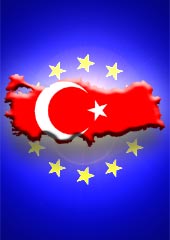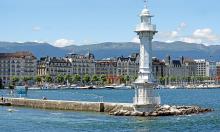Turkey's intention to join EU creates political dilemma
Turkey with its 66-million strong population has all chances to become the largest state of the European Union
Another stage of negotiations about Turkey's membership in the European Union is set to begin on October 3. All EU members have prepared their requirements for Ankara on the threshold of the talks. As it was expected before, Europe wants Turkey to acknowledge the Greek Cyprus and include the island in all agreements, which Turkey and the European Union have concluded before. 
Turkey submitted its EU membership bid in 1982 soon after its eternal rival, Greece, became a union member. The talks have not been able to progress for more than 20 years since then. European officials constantly accused the Turkish government of violating human rights, especially the rights of national minorities, of the weak economic development, etc. The EU welcomed ten new members during that period; Bulgaria and Romania are currently waiting for their turn, and Turkey would like to be the third in the line. However, the Turkish bid has been rejected again.
It seemed that Turkey had absolutely no chances to obtain a full membership in the European Union in 1997, during the talks about the union's expansion owing to the states of Eastern Europe. Turkish Islamic leader Necmettin Erbakan was determined to make Turkey a solely Islamic state. The secular-oriented military overthrew Erbakan, though, and Turkey submitted another bid to the EU. Turkey started conducting serious reforms afterwards: the Turkish government had to abolish death penalty, acknowledge the existence of national minorities, Kurds first and foremost, and sign a trade agreement with the EU. There were many other questions left, but the problem of Turkish-Cypriot relations is obviously the most important one of them.
Cyprus, which currently enjoys the reputation of a highly popular resort, used to be an English colony. It obtained independence in 1960, but the Turks and the Greeks living on the island could not come to a compromise about their future: everyone was trying to join their large ethnic fatherlands. A group of Greek military men overthrew the ruling leader archbishop Makarios and declared its intention to unite with Greece. Turkey in its turn deployed troops in the island and occupied the northern part of Cyprus. About 200,000 Greeks fled from the north of the island and about 40,000 Turks left the south of Cyprus as a result of numerous interethnic conflicts.
Cyprus became a divided state. The creation of the Turkish Republic of Northern Cyprus was announced in 1983: the republic won 38 percent of the territory and some about 20 percent of population. The international community, however, did not recognize the republic and viewed the leadership of the island's Greek part as the legal government of Cyprus. Turkey refused to recognize the Greek Cyprus, which had turned into a prosperous state owing to the tourist industry by that time. The authorities of the Turkish part of the island were declining any talks with the Greeks for many years afterwards.
The situation changed in 1997, when the administration of the Greek Cyprus started negotiations about the EU membership. The Turkish part of the island wished to accomplish the same. The referendum conducted in April of 2004 ended with the Turkish community welcoming the plan to unite the island, and with the Cypriot community rejecting it. Only the Greek part of the island became a part of the European Union: it just so happens that Turkey refuses to recognize a EU member in spite of its own wish to obtain the membership.
A certain progress in the dispute was expected on July 29, when the Turkish Prime Minister Recep Erdogan signed an additional protocol about the customs union with the EU. The document is to embrace ten new members of the European Union, including Cyprus. The Turkish Ministry for Foreign Affairs released a statement afterwards, which said that the signing of the protocol did not imply the recognition of the Republic of Cyprus. Spokespeople for Greek and Cypriot authorities stated in return that they would veto Turkey's membership in the European Union.
The Foreign Affairs Minister of Turkey accused the Cypriot administration of disrupting the talk process. Cypriot and Greek state officials, however, were more diplomatic in their comments. The President of Cyprus, Tassos Papadopoulos stated that none of EU states objected the launch of negotiations with Turkey. Greece supports Turkey's European perspectives, although it has certain requirements about it too.
The EU's Enlargement Commissioner, Oli Rehn, was sorry about Turkey's statement in connection with the signing of the additional protocol for the customs union treaty. “The European Union is formed to respond to Turkey's decision and release a statement about the obligations, which the union expects Turkey to abide by. Turkish ports must be open for all vessels of EU members, Cyprus inclusive,” the commissioner said. On September 21 all members of the European Union approved a joint statement, in which they urged Turkey to extend the customs union treaty on Cyprus.
There is another obstacle in addition to Cyprus, Kurds and the weak economic development. Opinion polls show that only 20 percent of Europeans are ready to see Turkey as a member of the European Union. When France and the Netherlands voted against the European Constitution, people voted against Turkey's membership in the EU too. Turkey with its 66-million strong population has all chances to become the largest state of the European Union.
On October 3 European leaders will have to ponder over a highly complicated issue: they should not let Turkey take an extremist Islamic orientation again, but they also need to find a way not to scare European electors off.
Ivan Shemelev
Subscribe to Pravda.Ru Telegram channel, Facebook, RSS!




